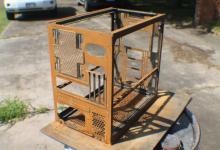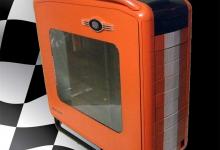Modding and Multimeters
Need to know a resistor's value without going blind? Maybe you think the voltage going to a fan is off, or maybe you just can't get that new part to work. A multimeter , a modders most versatile tool, can do it.
First what can a Multi-meter do? Depending on the make and model, they are capable of displaying AC/DC voltage, current, resistance, capacitance, temperature, and testing of much more. For computers you may not need all these features, but think ahead and get a good one. A good meter, like any other tool, can give many years of good service. For work with a computer you can use a meter with AC/DC voltage, current, resistance and temperature depending on the part to be checked. Computers use several different voltages in both AC/DC. There are 120 or 220 volt AC, 12volt +/-, 5 volt +/-, 3.3 volt DC.
Multi-meters, Multi choices
Getting a meter can be a big, daunting, confusing task. They can range in price from $25 to $500+ USD with tons of things you may never need or use. Some features to think about are Auto ranging, data hold button, and digital display. Any good meter should be UL approved for safety and measure best in the middle of the range. For example, if you are measuring a 12 volt DC circuit the range should be 24 volts, so plan on a meter that can read double your needs. The one in the image below has a maximum voltage of 750 Volts which means 480 volts should be safe and very accurate in top range. Accuracy should be 5% or less on most functions. Resistance and DC voltage should be no more then 2%.
With a multimeter you should get a basic pair of leads, manual and batteries (if your lucky), but as a modder you may want more options. Meters come with either a digital or analog display, digital is probably the easiest to learn to read. There are several different leads, amp clamp, temperature probe, mini grabber test clip, alligator clip and thin pin type leads for small connectors and circuits. A set of spare fuses and batteries are also good things to have on hand. There is nothing like late night modding and having to stop because of dead batteries, or a blown fuse. A case is useful for keeping the multimeter safe and the extras all in one place. You don't need anything fancy either, I just picked up a soft CD case to hold the meter, leads and manual. Another thing I have found very useful when using and testing with a multimtere are patch leads or jumpers (short leads with mini grabber test clips or alligator clips for connecting different test setups).
Above: Analog multimeter, digital multimeter & different test leads.
General Warnings
If you are getting or already have a meter, find out what it can do first. the maximum AC/DC volts, current, accuracy, and any other features like fuse size, lead ratings, and types. Learn the markings of the meter and the inputs markings and uses. Learn to connect the leads for different tests, most tests will use the common and positive leads. These are key to the safety of both you and your equipment.










